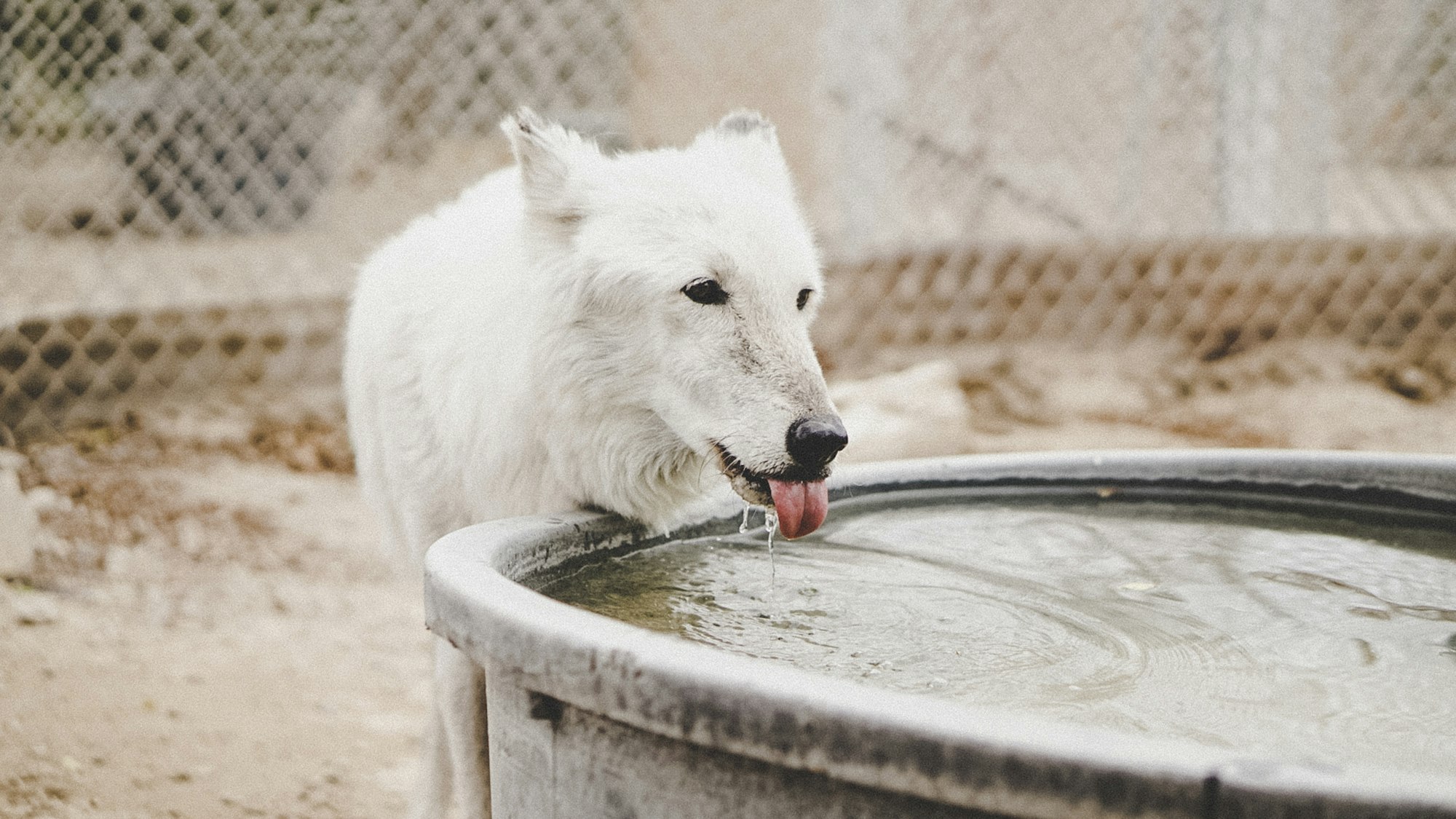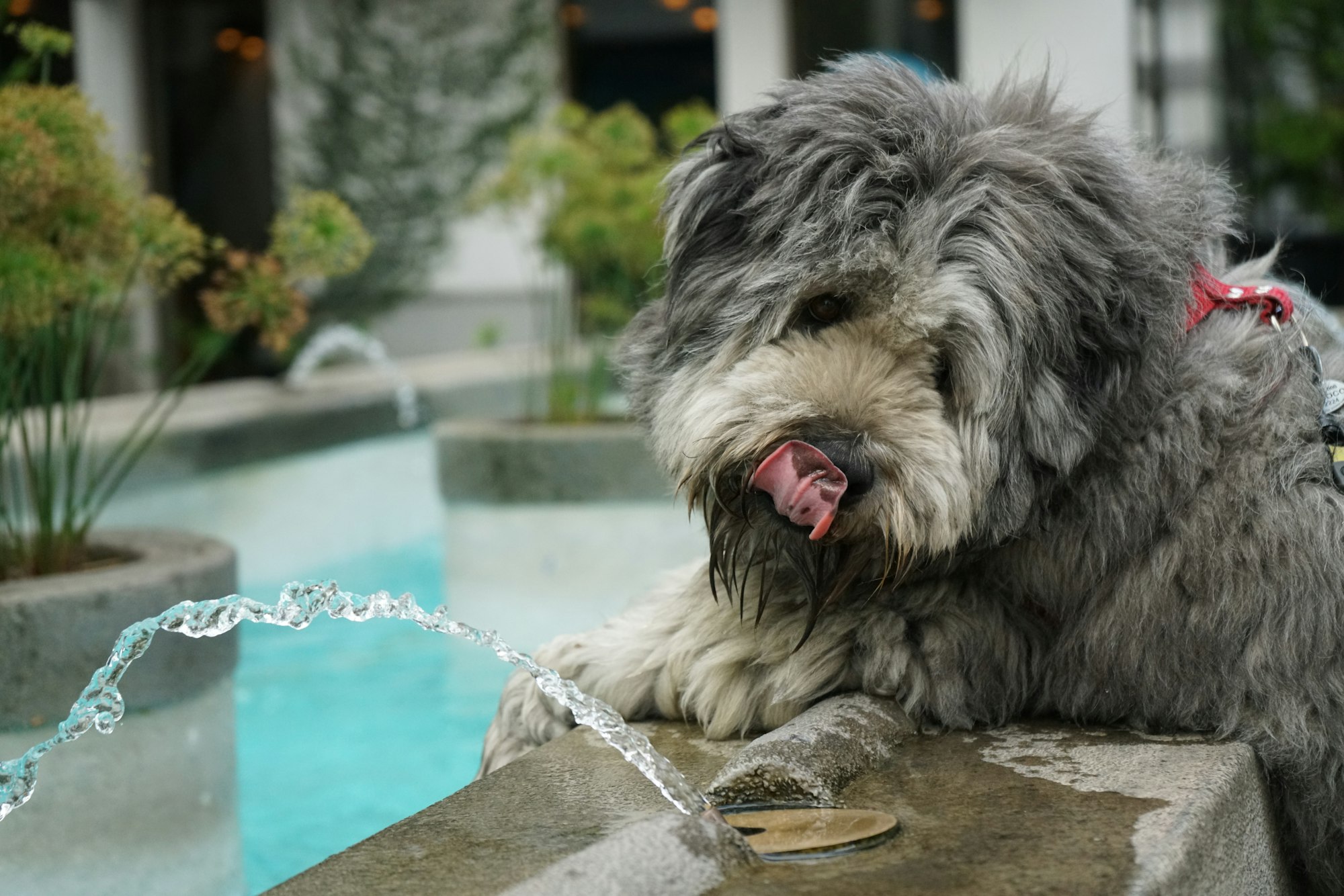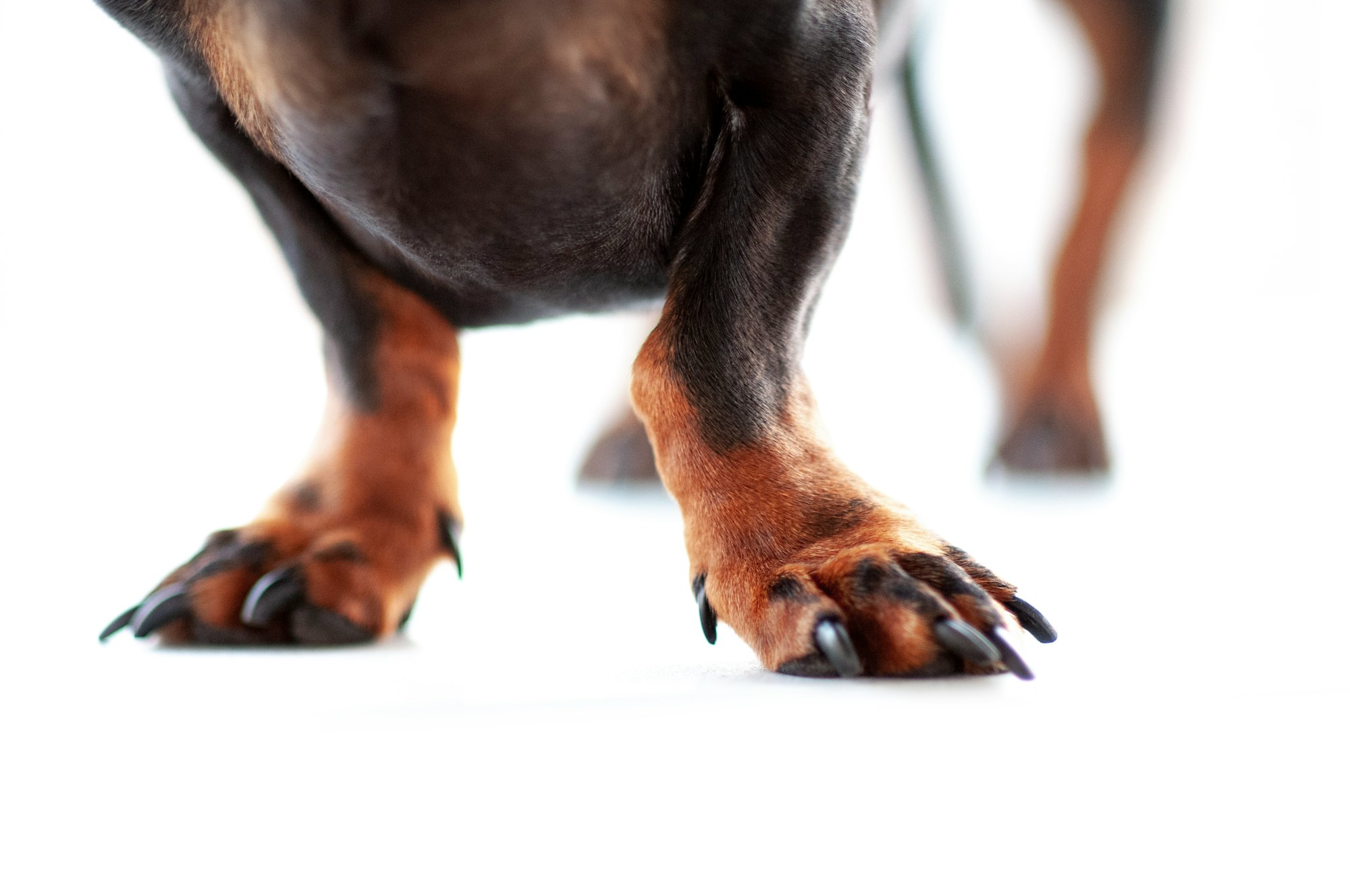One common concern dog owners may face is when their dogs throw up after drinking water. Observing your dog's drinking habits can be crucial in identifying any potential issues such as dehydration or overdrinking. This can be alarming, and understanding the reasons behind it is crucial for proper care of your furry friend.
There could be various factors contributing to this issue. Let’s delve into why dogs may vomit after drinking water, as well as potential causes for this occurrence. Ensuring your dog's health by providing clean, fresh water and avoiding stagnant water sources is essential.

Possible Causes of Vomiting After Drinking Water:
- Drinking Too Quickly: Dogs that gulp down water rapidly may end up swallowing air, leading to an upset stomach and subsequent vomiting.
- Change in Water Source: Introducing a new water source, such as tap water or water from a different location, can cause gastrointestinal disturbances in some dogs.
- Gastrointestinal Issues: Underlying gastrointestinal problems like gastritis, pancreatitis, or inflammatory bowel disease can make dogs more prone to vomiting after drinking water.
- Dietary Factors: Certain foods, treats, or a sudden change in diet can also result in vomiting after water intake.
When should you be concerned about your dog’s vomiting after drinking water? It is advisable to consult a veterinarian if the vomiting is persistent, accompanied by other concerning symptoms, or if your dog has difficulty keeping any fluids down.
If your dog does vomit after drinking water, there are a few steps you can take at home to help alleviate the issue:
- Monitor Your Dog: Keep an eye on their behavior and note any changes in appetite, energy levels, or overall well-being.
- Check for Other Symptoms: Look for signs of dehydration, lethargy, blood in vomit, or any other abnormal symptoms that may warrant immediate veterinary attention.
- Offer Small Amounts of Water: Instead of allowing your dog to gulp down a large amount of water at once, offer small frequent sips to prevent overconsumption.
- Consult with a Veterinarian: If the vomiting persists or is accompanied by other concerning symptoms, it is essential to seek professional advice from a veterinarian.
To prevent vomiting after drinking water, consider the following measures:
- Slow Down Water Intake: Encourage your dog to drink at a slower pace by using specific bowls or slow-feeders designed to regulate their water intake.
- Provide Fresh and Clean Water: Ensure that your dog has access to clean and fresh water at all times. Regularly change the water to maintain its quality.
- Evaluate Your Dog’s Diet: If dietary factors are suspected, consult with a veterinarian to assess their current diet and make any necessary adjustments.
By understanding the potential causes, knowing how to respond when vomiting occurs, and implementing preventive measures, you can help maintain your dog’s hydration and overall well-being.
Key takeaway:
- Drinking too quickly: Dogs may vomit after drinking water too quickly. This can be prevented by encouraging slower drinking or using a specialized water bowl.
- Gastrointestinal issues: Vomiting after drinking water can also be a sign of gastrointestinal problems such as gastritis or pancreatitis. These issues should be addressed by a veterinarian.
- Possible dietary factors: Certain types of food, treats, or sudden dietary changes can cause a dog to vomit after drinking water. Assessing the diet and making appropriate adjustments may help prevent this issue.
Dogs may throw up after drinking water for various reasons such as drinking too fast, eating too quickly after drinking, or having an underlying health issue. When dogs drink too quickly, they ingest air, which can lead to vomiting. If a dog eats immediately after drinking, the stomach can become distended, causing nausea and vomiting.
It is also possible that a dog may have an upset stomach or a more serious condition that needs veterinary attention. To prevent vomiting, try feeding smaller meals, providing access to fresh water throughout the day, and seeking veterinary advice if the problem persists.
Possible Causes of Vomiting After Drinking Water
If your furry friend has ever had a case of vomiting after drinking water, you know it can be concerning. In this section, we’ll explore the possible causes behind this unpleasant experience. Blue green algae exposure, found in ponds, lakes, and rivers, can pose serious health risks to dogs. From drinking too quickly to a sudden change in water source, contaminated water can make a dog sick, leading to gastrointestinal issues and dietary factors that contribute to this discomfort. So, grab a tea and let’s dive into the world of doggy digestion!
Drinking Too Quickly
Vomiting water can occur when dogs drink too quickly. When dogs gulp down water rapidly, it can lead to the stomach expanding too quickly, causing discomfort and regurgitation. Factors such as intense play, feeling nauseous, or hot weather can contribute to excessive thirst and drinking too quickly. To prevent this, happy dog owners can try giving their pets smaller amounts of water at a time, using a slow feeder bowl, or adding ice cubes to slow down drinking. Keeping water bowls clean and providing fresh, clean water can also help prevent digestive issues.
Change in Water Source
A change in water source can be a potential cause of vomiting in dogs after drinking. Dogs may be sensitive to the different mineral content or additives present in a new water source, causing an upset stomach. It is important to monitor your dog's reaction to the change in water source and slowly introduce it to avoid any digestive issues. If your dog continues to vomit after drinking water from a different source, it is best to consult with a veterinarian to rule out any underlying health issues. Ensuring that your dog has access to clean and fresh water is essential in preventing vomiting episodes.
Gastrointestinal Issues
Gastrointestinal issues can contribute to dog vomiting after drinking water. These issues may include:
- Food Allergies: Some dogs may have sensitivities or allergies to certain ingredients in their food, leading to an upset stomach and vomiting after drinking water.
- Foreign Bodies: If a dog ingests something indigestible, like a stone or a toy, it can cause irritation or blockage in the gastrointestinal tract, resulting in vomiting.
- Gastrointestinal Blockages: Conditions like laryngeal paralysis or a twisted stomach can prevent food and water from passing through properly, leading to regurgitation after drinking water.
- Gastrointestinal Infections: Bacterial or viral infections in the digestive tract can cause inflammation and upset stomach, resulting in vomiting.
- Metabolic Disease: Dogs with underlying metabolic conditions, such as liver or kidney disease, may experience vomiting after drinking water due to the body’s inability to properly process fluids.
A vomiting dog may also be experiencing issues such as overactivity, drinking contaminated water, or internal physical deformities.
One true story illustrates the impact of gastrointestinal issues on a dog’s vomiting after drinking water. Max, a Labrador Retriever, frequently vomited after drinking water. After consulting with a veterinarian, it was discovered that Max had ingested a small toy that was causing gastrointestinal blockages. Prompt treatment and the removal of the toy resolved Max’s vomiting issues.

Dietary Factors
Some dietary factors can contribute to dogs throwing up after drinking water. It's important to evaluate their diet to address this issue. Consider the following tips:
- Food Allergies: Certain ingredients may not agree with your dog's digestive system.
- Eating Too Quickly: Dogs who gulp down their food may also drink water too quickly, leading to vomiting.
- Cold Water: Drinking ice-cold water can sometimes cause an upset stomach.
- Contaminated Water: Polluted or unclean water sources can also cause vomiting.
Pro-tip: Incorporate dietary factors into your dog's diet by feeding them smaller, more frequent meals and ensuring they have access to clean, fresh water throughout the day.
Enhance Your Mini Basset Hound's Safety with the Fi Dog Collar
Keeping your Mini Basset Hound safe and secure is easier than ever with the Fi Dog Collar. This advanced GPS tracking collar not only monitors your dog's location but also tracks their activity levels, helping you ensure they stay healthy and within safe boundaries. Whether your Mini Basset Hound is frolicking in the backyard or on an adventure with you, the Fi Dog Collar provides real-time alerts if they wander out of the designated safe zone.
Perfect for small breeds like the Mini Basset Hound, the collar is designed for comfort and durability. Give yourself peace of mind and your furry friend the freedom to explore safely. Try the Fi Dog Collar today and keep your companion close, no matter where they roam.
When to Be Concerned About Dog Vomiting After Drinking Water?
Vomiting after drinking water can be a cause for concern, indicating an underlying health issue in your dog. Pay attention to the frequency and severity of the vomiting, as well as any other symptoms. If your dog vomits once but otherwise seems fine, it may not be a cause for immediate concern. If the vomiting persists or is accompanied by other symptoms such as diarrhea or lethargy, it is important to consult a veterinarian. They can help determine the underlying cause and provide appropriate treatment. Remember, it is always better to be safe than sorry when it comes to your pet’s health. If your dog experiences chronic vomiting, severe abdominal discomfort, symptoms of bloat, abnormal water consumption, or exposure to contaminated water, you should vet immediately.
Fact: Vomiting after drinking water can be a sign of conditions like gastroenteritis, kidney disease, or ingestion of toxic substances, so it’s essential to seek veterinary advice if it persists.
What to Do If Your Dog Throws Up After Drinking Water?
If your furry friend suddenly regurgitates after quenching their thirst, it can be quite concerning for any pet owner. In this section, we’ll explore what steps pet owners can take if their dog throws up after drinking water. From closely monitoring your pup’s behavior to assessing for any additional symptoms, we’ll provide practical tips to help you navigate this situation. We’ll discuss the importance of offering small amounts of water and when it may be necessary to seek professional advice from a veterinarian. Buckle up and let’s dive into this essential guide for caring for your pup!
Monitor Your Dog
Monitoring your dog's behavior and health is crucial when you need to monitor your dog for any changes in their drinking habits and overall well-being. If you notice that they throw up after drinking water, here are some important steps to take:
- Observe your dog closely for any other symptoms, such as lethargy, loss of appetite, or diarrhea.
- Check for signs of dehydration, such as dry gums and excessive panting.
- Offer small amounts of water to prevent further vomiting and to keep your dog hydrated.
- If the vomiting persists or your dog shows worsening symptoms, make sure to monitor your dog's condition and seek veterinary advice.
- Regularly monitor your dog's drinking habits and overall well-being for any changes or recurring issues.
A friend of mine experienced a similar situation with her Labrador Retriever. After closely monitoring his vomiting episodes, she discovered that he had developed a food allergy. With the guidance of a veterinarian, she switched his diet and managed his symptoms effectively.
Check for Other Symptoms
When your dog throws up after drinking water, it is important to check for other symptoms to determine the underlying cause. Additionally, it is crucial to be vigilant for signs of lethargy, diarrhea, loss of appetite, excessive drooling, and abdominal pain. These particular symptoms assist in identifying whether the vomiting is a result of an upset stomach, a gastrointestinal issue, or a more serious underlying health condition. In case your dog displays any worrying symptoms or if the vomiting continues, it is highly recommended to seek the advice of a veterinarian for an accurate diagnosis and appropriate treatment. Always remember to provide your furry friend with fresh and clean water.
Offer Small Amounts of Water
To address a dog throwing up after drinking water, offering small amounts of water can help alleviate the issue. Here are the steps to follow:
- Monitor your dog and observe their behavior.
- Check for any other symptoms like diarrhea or lethargy.
- Offer small amounts of water at a time to prevent overloading the stomach.
- If the vomiting continues or other concerning symptoms arise, consult with a veterinarian.
Providing small amounts of water can help prevent further upset stomach and allow your dog's digestive system to settle. It's important to seek veterinary advice if the problem persists or worsens.
Consult with a Veterinarian
If your dog throws up after drinking water, it is crucial to consult with a veterinarian. Vomiting after drinking water can be a sign of an underlying health issue, such as kidney failure or gastrointestinal problems. Consulting with a veterinarian will help ensure proper diagnosis and appropriate treatment for your dog's well-being. A veterinarian will be able to assess your dog's condition and determine the cause of the vomiting. They may recommend further tests or provide treatment options. It is crucial to seek prompt veterinary care, especially if the vomiting is frequent or accompanied by other symptoms. Consult with a veterinarian to ensure the best care for your dog.
Preventing Vomiting After Drinking Water
Preventing your dog from experiencing the discomfort of vomiting after drinking water is crucial. In this section, we'll explore effective strategies to alleviate this issue. From slowing down water intake to ensuring fresh and clean water, we'll uncover the key steps to keeping your furry friend hydrated without any tummy troubles. We'll discuss the importance of evaluating your dog's diet in order to address any underlying causes that may contribute to this problem. So, let's dive in and learn how to keep your dog's water consumption a pleasant experience!
Slow Down Water Intake
If your dog frequently throws up after drinking water, it might be helpful to Slow Down their water intake. Here are some steps to consider:
- Provide a shallow water bowl to prevent your dog from drinking too much at once.
- Offer water in small amounts throughout the day rather than allowing them to gulp down a large amount all at once.
- Consider using a slow feeder bowl specifically designed to pace your dog's drinking.
- Make sure the water is at room temperature as very cold water might trigger an upset stomach.
- Encourage your dog to take breaks while drinking to avoid overexertion.
Pro-tip: If your dog continues to experience vomiting after drinking water, it's important to consult with a veterinarian to rule out any underlying health issues.
Provide Fresh and Clean Water
Ensuring that your furry friend has access to fresh and clean water is crucial for their overall health and well-being. To achieve this, follow these steps:
- Regularly cleanse your dog's water bowl to eliminate any dirt or bacteria buildup.
- Top up the water bowl with fresh water several times throughout the day to prevent it from becoming stagnant.
- Consider using a water fountain or an automatic dispenser that filters and circulates the water, keeping it clean and pure.
- Stay vigilant and monitor the water level to ensure that your dog always has sufficient access to water.
- When the weather is hot or when your dog is engaged in increased activity, provide additional water to keep them hydrated.
Evaluate Your Dog's Diet
Evaluating your dog's diet is crucial when they throw up after drinking water. It is important to assess the quality of dog food that you are providing for your furry friend. Ensure that your dog is on a balanced and nutritious diet to promote overall health and well-being.
In addition to the quality of food, it is vital to consider any potential allergies that your dog may have. Food allergies can cause vomiting, so it is necessary to identify and eliminate any allergens from their diet. This can help to alleviate their symptoms and prevent further discomfort.
Another aspect to consider is the meal size and frequency. Splitting meals into smaller portions or adjusting their feeding schedule may be beneficial for your dog. This can aid in preventing overeating and reduce the chances of vomiting after drinking water.
To discourage rapid eating, you can try using slow-feed bowls or puzzle toys. These can help to slow down your dog's eating pace and prevent them from gulping down their food and water too quickly.
In addition to evaluating the food, it is essential to provide your dog with clean and fresh water. Water quality plays a significant role in preventing the ingestion of contaminants that could potentially cause vomiting.
If vomiting persists or is accompanied by other concerning symptoms, it is crucial to consult a veterinarian for further evaluation. They can offer professional advice and guidance tailored to your dog's specific needs.
A real-life example is my friend's dog who started throwing up after drinking water. After carefully evaluating the dog's diet, they discovered that the food brand they had recently switched to was the cause of the issue. By promptly switching back to the previous brand, the vomiting episodes ceased, and the dog no longer experienced any discomfort after drinking water. Remember, always monitor your dog's diet and make informed decisions to keep them healthy and happy.

Frequently Asked Questions
- Why do dogs frequently throw up after drinking water?
- Dogs frequently throw up after drinking water because they have evolved as scavengers and tend to consume things quickly, including water. If they drink too much water too quickly, their stomach can contract and cause vomiting.
- Are large breed dogs more prone to throwing up after drinking water?
- Yes, certain breeds, such as smushed-face breeds and schnauzers, are more prone to digestive issues and may vomit bile regularly. However, if a dog is not a breed with a naturally sensitive stomach and is vomiting clear water, it could indicate a thyroid or kidney issue.
- When should I be concerned about my dog throwing up after drinking water?
- If your dog is frequently throwing up after drinking water, especially if the vomit is yellow or if there are other symptoms present, it is important to consult a vet. This could indicate a more serious underlying health issue.
- Can contaminated or polluted water cause dogs to throw up?
- Yes, unclean water sources can contain bacteria and other infectious organisms that can make dogs sick. It is important to provide dogs with clean, fresh, and potable water, and discourage them from drinking from stagnant pools.
- What can I do if my dog drinks water too quickly and throws up?
- If your dog drinks water too quickly and vomits, you can try placing a clean stone in their water bowl or giving them small amounts of water to drink at a time. This can help slow down their drinking and prevent vomiting.
- Should I be concerned if my dog continues to vomit water frequently?
- Yes, if your dog continues to vomit water frequently, it may indicate a serious health issue that requires prompt treatment. Chronic vomiting can be a sign of underlying medical conditions such as liver disease or metabolic disorders. Consult a vet for proper diagnosis and treatment.

